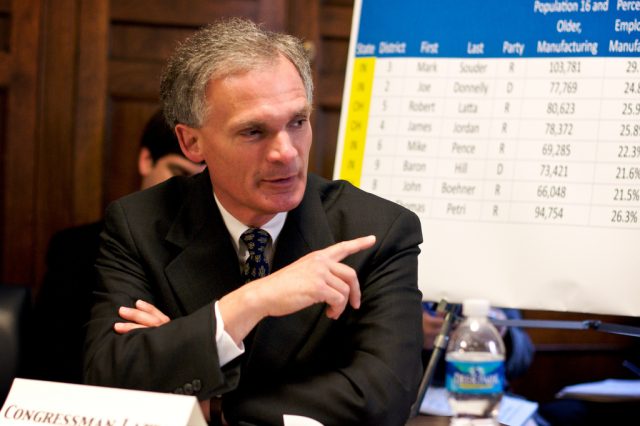Congressman bankrolled by ISPs tries to halt Internet regulation
AT&T, Comcast, Verizon, Time Warner Cable give to anti-FCC lawmaker.

US Rep. Bob Latta (R-OH).
US Rep. Bob Latta (R-OH) on Wednesday filed legislation that would prevent the Federal Communications Commission from attempting to regulate broadband Internet service as a public utility.
It probably won't surprise you that Internet service providers have enthusiastically given money to this congressman. As we reported in our May 16 story "Bankrolled by broadband donors, lawmakers lobby FCC on net neutrality," Latta received $51,000 from cable company interests in the two-year period ending December 2013.
Latta was one of "28 House members who lobbied the Federal Communications Commission to drop net neutrality," with those lawmakers having "received more than twice the amount in campaign contributions from the broadband sector than the average for all House members," our story noted.
A member of Congress since 2007, Latta received $32,500 from political action committees (PACs) representing AT&T and individuals who work for AT&T in his career, according to OpenSecrets' list of his top contributors. He received an additional $29,500 from the National Cable & Telecommunications Association and $21,000 from Time Warner Cable-linked interests. Verizon PACs and individuals gave him $16,000, the American Cable Association gave him $15,000, CenturyLink PACs gave him $11,400, and Comcast PACs gave him $11,000.
Not content with lobbying the FCC, Latta this week by filing a bill (PDF) with the title, "To amend the Communications Act of 1934 to limit the authority of the Federal Communications Commission over providers of broadband Internet access service."
Latta described his legislation as an attempt to "keep [the] Internet open and accessible."
His facts are slightly off in a press release. The announcement says Latta's legislation would "ensure the Internet remains open and free from government interference by limiting the Federal Communications Commission’s (FCC) authority to regulate broadband under Title II of the Communications Act. The legislation comes after the FCC released a proposal to reclassify broadband Internet access under Title II as a telecommunications service rather than an information service."
In fact, the FCC's proposal does not propose reclassifying broadband as a Title II service. (Title II or "common carrier" services, such as the traditional phone network, can be regulated as public utilities.)
Network neutrality advocates have asked the FCC to reclassify broadband as Title II, saying it would let the commission outlaw Internet "fast lanes" in which Web services pay ISPs for priority access to consumers. The FCC has proposed using different authority (Section 706 of the Telecommunications Act) to regulate broadband while allowing such fast lanes, but it asked the public for comment on whether it should use Title II instead. FCC Chairman Tom Wheeler has so far not proposed reclassifying broadband, but he said he is open to doing so if the FCC's net neutrality proposal "turns out to be insufficient or if we observe anyone taking advantage of the rule."
Latta appears to think that the FCC has decided to reclassify broadband as a common carrier service. “In light of the FCC initiating yet another attempt to regulate the Internet, upending long-standing precedent and imposing monopoly-era telephone rules and obligations on the 21st Century broadband marketplace, Congress must take action to put an end to this misguided regulatory proposal,” Latta said in his announcement. "The Internet has remained open and continues to be a powerful engine fueling private enterprise, economic growth and innovation absent government interference and obstruction. My legislation will provide all participants in the Internet ecosystem the certainty they need to continue investing in broadband networks and services that have been fundamental for job creation, productivity, and consumer choice."
Latta didn't get any co-sponsors for the bill, suggesting it's little more than a symbolic gesture. After being introduced Wednesday, the legislation was referred to the House Committee on Energy and Commerce. A Latta spokesperson told Ars, "We will be working with Committee on next steps."
